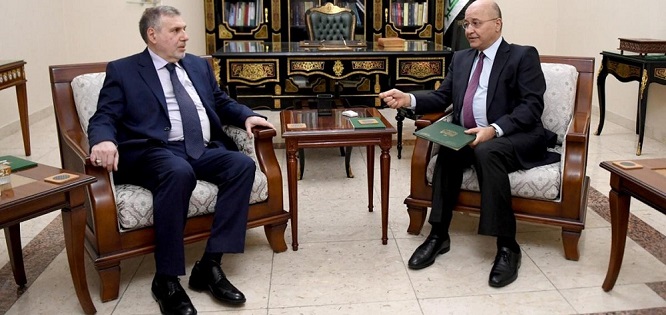
After weeks of twists and turns overshadowing the Iraqi politics, the political parties have reached an agreement on a successor to the resigned Prime Minister Adel Abdul Mahdi. On Friday, President Barham Salih named Mohammed Tawfiq Allawi as the new PM. This choice reveals the Iraqi politiciansí understanding that the country needs a new government to hold new elections in the near future. Allawi has a difficult mission though as the country is moving through the crises it has been witnessing over the past few months.
Allawiís biography
Mohammed Allawi was born in Baghdad in 1954. He passed his elementary and secondary school in the capital. He studied architecture at the University of Baghdad but dropped out a year before his graduation and left the country to Lebanon in 1977. In 1980, he continued his studies at the American University of Beirut. While a young man, he joined the Dawa Party of Iraq. He separated from the party due to ideological differences, however.
He officially joined the politics again in 2005 when he was named part of an Ayad Allawi-led coalition to become a candidate for the 2006 general elections. He was named minister of communications in the same year, up to 2007. He left his cabinet post to be a member of parliament replacing a late lawmaker from the same list. Allawi once again was named minister of communications in 2010, until he resigned from the position as differences broke out between him and PM Nouri Al-Maliki. Ideologically, he is close to the former PM Ayad Allawi, a liberal politician, and has always run for the elections under his list. Ayad joined the political races in the country under various lists like Iraqi List, National List, and National Coalition since the dictator Saddam Hussein was toppled by the US invasion of the country in 2003.
Repeating "technocratic government" slogan
In his first address as a PM-designate, Allawi talked about a set of important issues the essence of which is that he will focus his efforts on forming a technocratic government. The first and perhaps the most important issue was that he threatened he will resign from the position if the political factions try to foist their candidates for ministries on him.
He asserted that he would like to form a government away from partisan sharing. He also said he wants the demonstrators to continue their protests and would meet the protest movementís representatives. He also promised to bring to justice those who have taken arms against the protestors. Allawi also emphasized on setting date for new parliamentary elections, altering the party laws. Besides, he said he wants financial transparency of the political parties and politicians, and to restore the "glory" of the armed forces. Fighting corruption also received special emphasis from the new PM. All these issues, the analysts note, bear signs the new PM is inclined to form a technocratic government, though his voyage towards his goal would face major uncertainties.
Picking Allawi has drawn some opposition from the protestors. They argue that he in the past was sentenced to six years in jail for corruption charges. The court cleared him from all charges when he returned to the country in 2014, however. But the fact is that this record can make things difficult for him in the upcoming days as he starts consultations to pick his cabinet ministers. The background can put his position on shaky ground, perhaps making his premiership last only until the parliamentary elections.
When al-Sadr, too, understands the need to move past the crisis
Allawi choosing received the welcome of political alliances and most importantly Muqtada al-Sadr, the influential religious leader and head of the Saerun Alliance in the parliament. In a Twitter message, al-Sadr said he hopes the new PM would not yield to the foreign and home pressures and at the same time speed up the arrangements for early elections.
"Today, the history will write that people of Iraq and not the political groups have chosen their prime minister. This is a good step and will improve the future." he also said in a statement.
The support offered to the new PM by the powerful religious leader after months of crisis and turmoil in the country is an indication that al-Sadr has figured out that to weather the crisis and block further foreign meddling in the home affairs forming a new government is a must. This issue by itself is as important as picking a new PM. By throwing his weight behind the new PM, the leader of the biggest parliamentary alliance has shown that the ranks of the patriotic Iraqis are separate from those of mercenaries to foreign, and mainly American, agenda. He told other parties that he is poised to unite and work with them when it comes to national interests.
Allawi and difficulties of administration
What the resigned PM Abdul Mahdi promised in 2018 when he was named new PM also was promised by Allawi though with even greater emphasis. Allawiís promise of staying independent in his picking of the new ministers echoed the words of Abdul Mahdi two years ago. But he will have to show if he can win the support and trust of the protestors, political parties, regional actors, and trans-regional powers. No matter who is taking the PM post in Iraq, the new figure should develop the capability to manage a fine line between the home and foreign actors. This does not look possible unless Allawi would embark on a firm approach to promote Iraqís stability and run serious efforts to resolve the economic challenges.
LINK: https://www.ansarpress.com/english/13568
TAGS:






























 Violation of the sovereignty and rights of afghan citizens by America
Violation of the sovereignty and rights of afghan citizens by America




